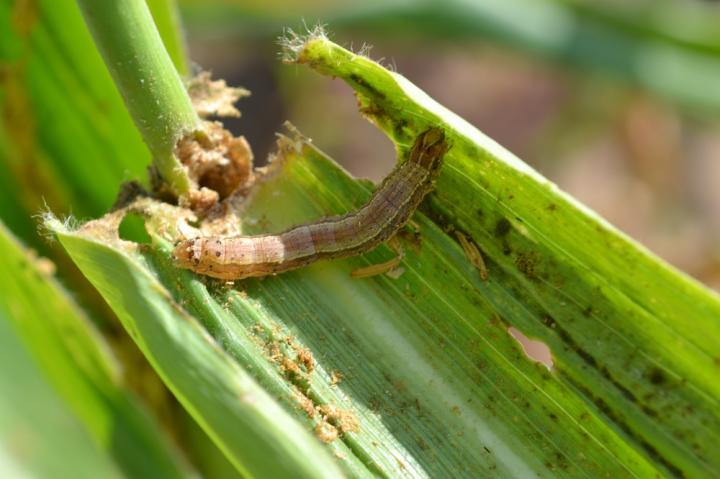CABI scientists have updated the first major study of potential biological controls that could be used in the fight against the devastating fall armyworm in Africa. The research offers new insight into evidence of their efficacy in the field and increased

Credit: CABI
CABI scientists have updated the first major study of potential biological controls that could be used in the fight against the devastating fall armyworm in Africa. The research offers new insight into evidence of their efficacy in the field and increased availability as commercial products.
Indeed, the review, published in the Journal of Applied Entomology, includes many biocontrol products which are now featured in the CABI BioProtection Portal – a free web-based tool that enables users to discover information about registered biocontrol and biopesticide products around the world.
The fall armyworm (Spodoptera frugiperda) attacks around 100 species of plant but favours maize. It has already caused substantial damage to staple crops grown by smallholder farmers in many parts of Africa.
Lead researcher Dr Melanie Bateman, together with other CABI colleagues and scientists from the International Centre of Insect Physiology and Ecology (ICIPE) in Nairobi, Kenya, and Lancaster University, UK, reveal the revised list of biopesticide active ingredients (AI) – which have been registered in one or more of the 30 study countries for fall armyworm management – now stands at 41.
The current paper builds on the first assessment (Bateman et al, 2018) by profiling four additional AI. These are Aspergillus oryzae, Autographa californica multiple nucleopolyhedrovirus (AcMNPV), Spodoptera littoralis nucleopolyhedrovirus
(SpliNPV) and thyme oil.
Dr Bateman said, “Many smallholder farmers continue to resort to pesticides to tackle the fall armyworm but we believe that safe, sustainable and effective interventions such as biopesticides should be a key element of Integrated Pest Management plans.
“This is particularly important when you consider that many farmers are using highly hazardous pesticides without personal protective equipment and the use of broad-spectrum pesticides can negatively impact natural enemies to help manage fall armyworm.”
The scientists add that since the first assessment field trials demonstrating the efficacy have been carried out for eight AIs (A. oryzae, azadirachtin, B. thuringiensis subsp. aizawai, maltodextrin, FAW sex pheromones, spinosad, Spodoptera frugiperda multiple nucleopolyhedrovirus and Spodoptera littoralis nucleopolyhedrovirus) which has led to products being registered across some countries in Africa.
Dr Steve Edgington, co-author of the paper and who is responsible for product data on the CABI BioProtection Portal, said, “The findings of this update are encouraging. In the relatively short time since the last assessment, the number of biopesticide AIs registered per country that could potentially be used to manage FAW has more than doubled, and there have been similar increases in the numbers of products registered. But of course, at the farm gate knowledge is still needed of what products are actually available and how to use them correctly.”
“I would recommend farmers and extension workers to keep up to date with the latest biopesticide products available in their region to fight the fall armyworm, and a range of other pests for that matter, by using tools such as the CABI BioProtection Portal.”
The researchers added that further studies could include, for many AIs, looking at establishing the most cost-effective method of use to fight the fall armyworm.
###
Additional information
Photo: Fall armyworm on maize (Credit: CABI).
Full paper reference
Bateman ML, Day RK, Rwomushana I, et al. Updated assessment of potential biopesticide options for managing fall armyworm (Spodoptera frugiperda) in Africa.
J Appl Entomol. 2021;00:1-10.
https:/
Funding acknowledgement
CABI is an international intergovernmental organization, and we gratefully acknowledge the core financial support from our Member Countries (and lead agencies) including the United Kingdom (Foreign, Commonwealth & Development Office-FCDO), China (Chinese Ministry of Agriculture and Rural Affairs), Australia
(Australian Centre for International Agricultural Research), Canada(Agriculture and Agri-Food Canada), Netherlands (Directorate-General for International Cooperation-DGIS) and Switzerland (Swiss Agency for Development and Cooperation). See https:/
This work was carried out as part of the Action on Invasives programme,
which is funded by DGIS and FCDO. This paper is an update to a previous study funded by the Global Project ‘Green Innovation Centres for the Agriculture and Food Sector’ implemented by the Deutsche Gesellschaft für Internationale Zusammerarbeit (GAS), commissioned by the Federal Ministry of Economic Cooperation and Development (BMZ). This review is the work of the authors and
does not necessarily reflect the views of DGIS, FCDO or GIN. CABI and the authors would like to thank partners in national governments in Africa for their support and contributions, Stuart Bateman (Bozeman, Montana, USA) for support with the pesticide analysis and Roma Gwynn (Biorationale) for advice.
Media Contact
Wayne Coles
[email protected]
Original Source
https:/
Related Journal Article
http://dx.




